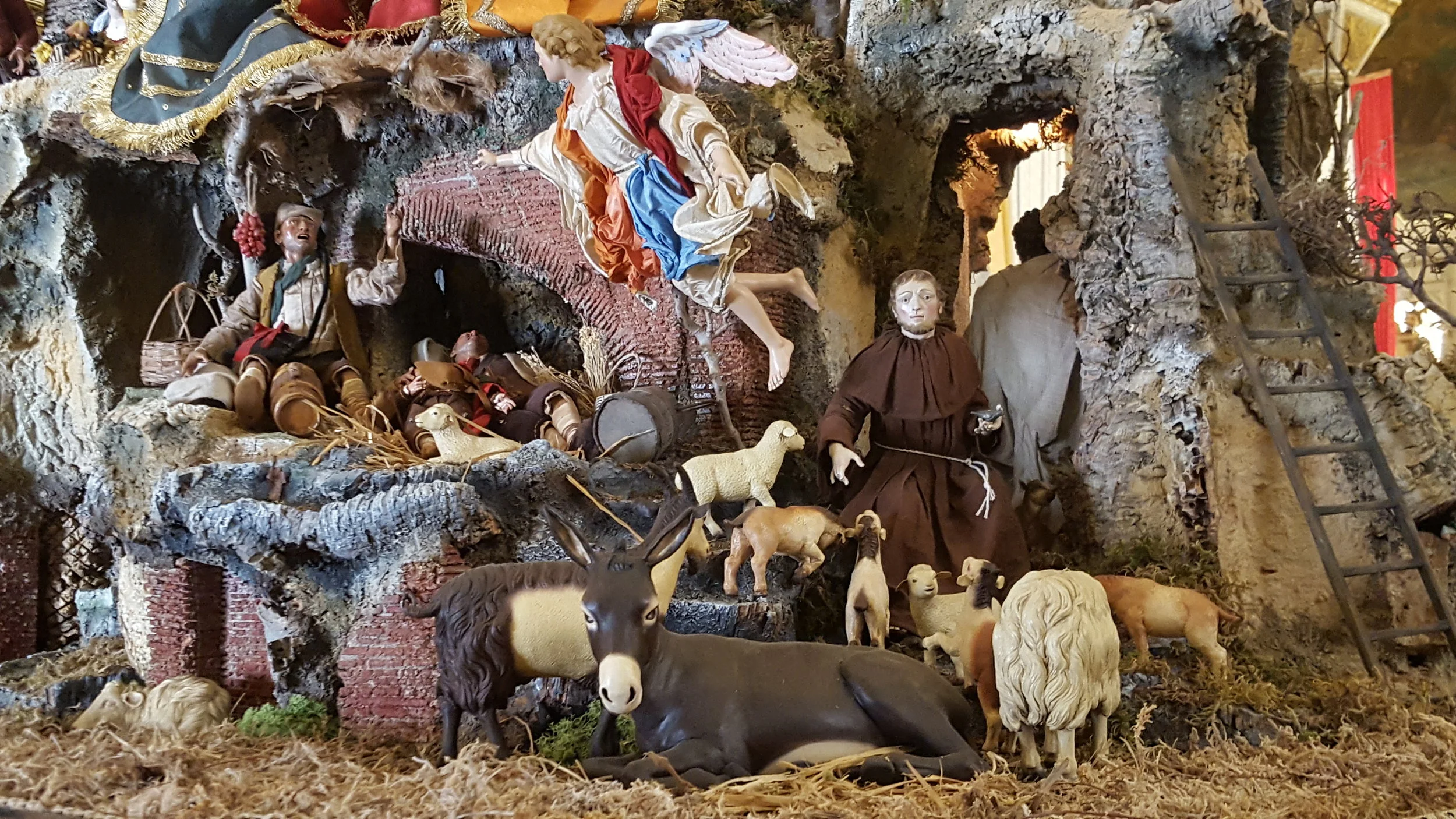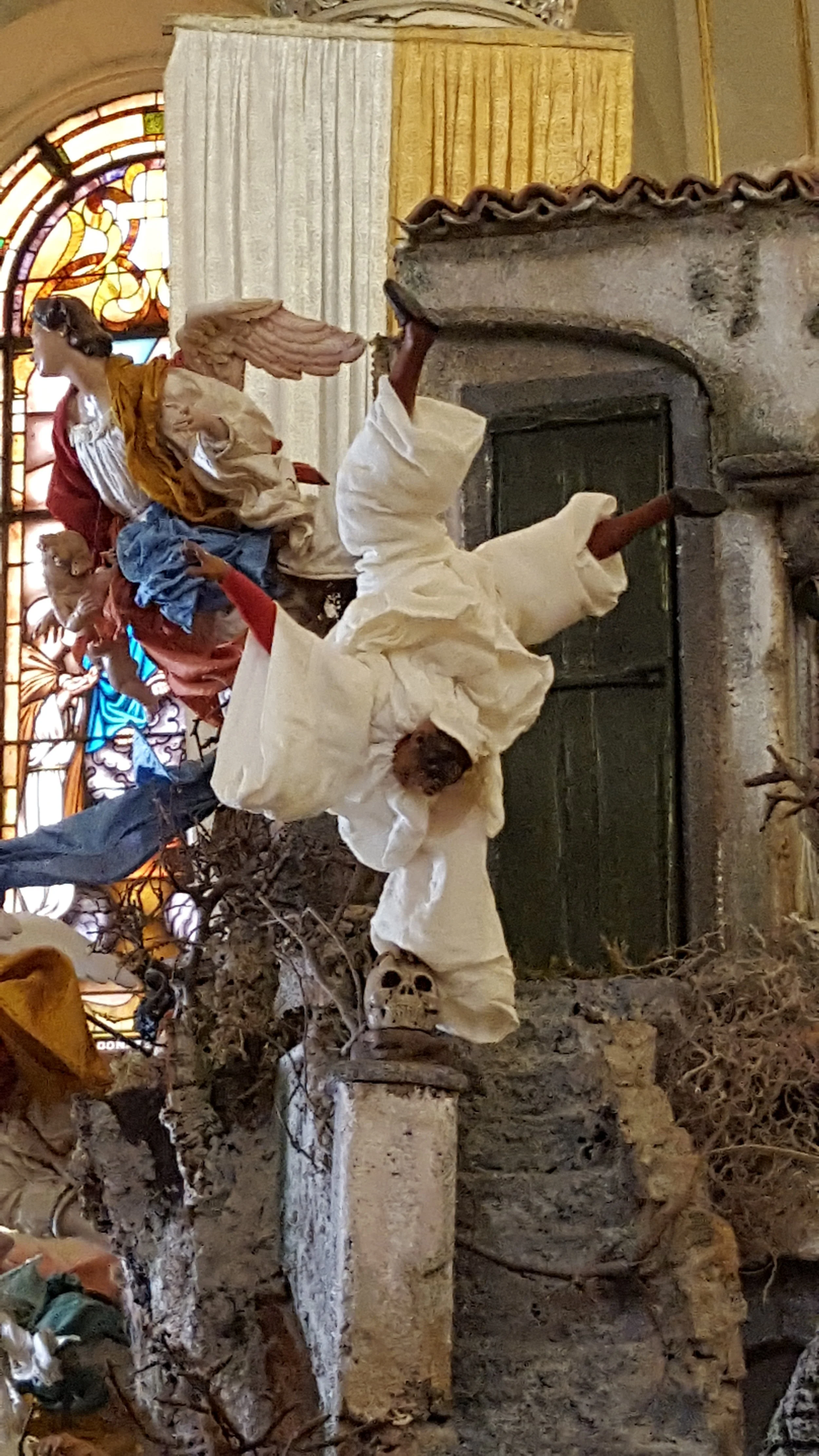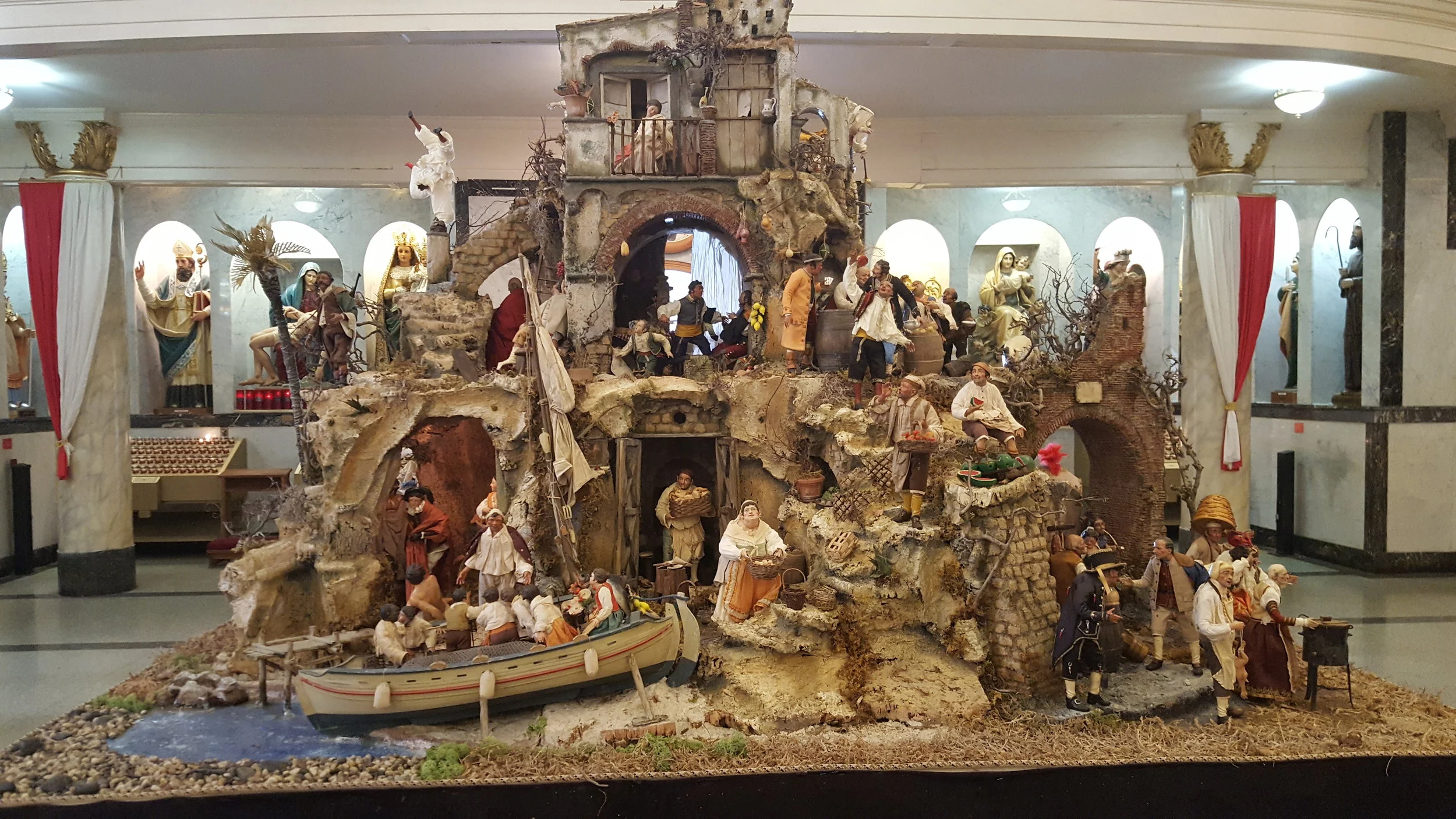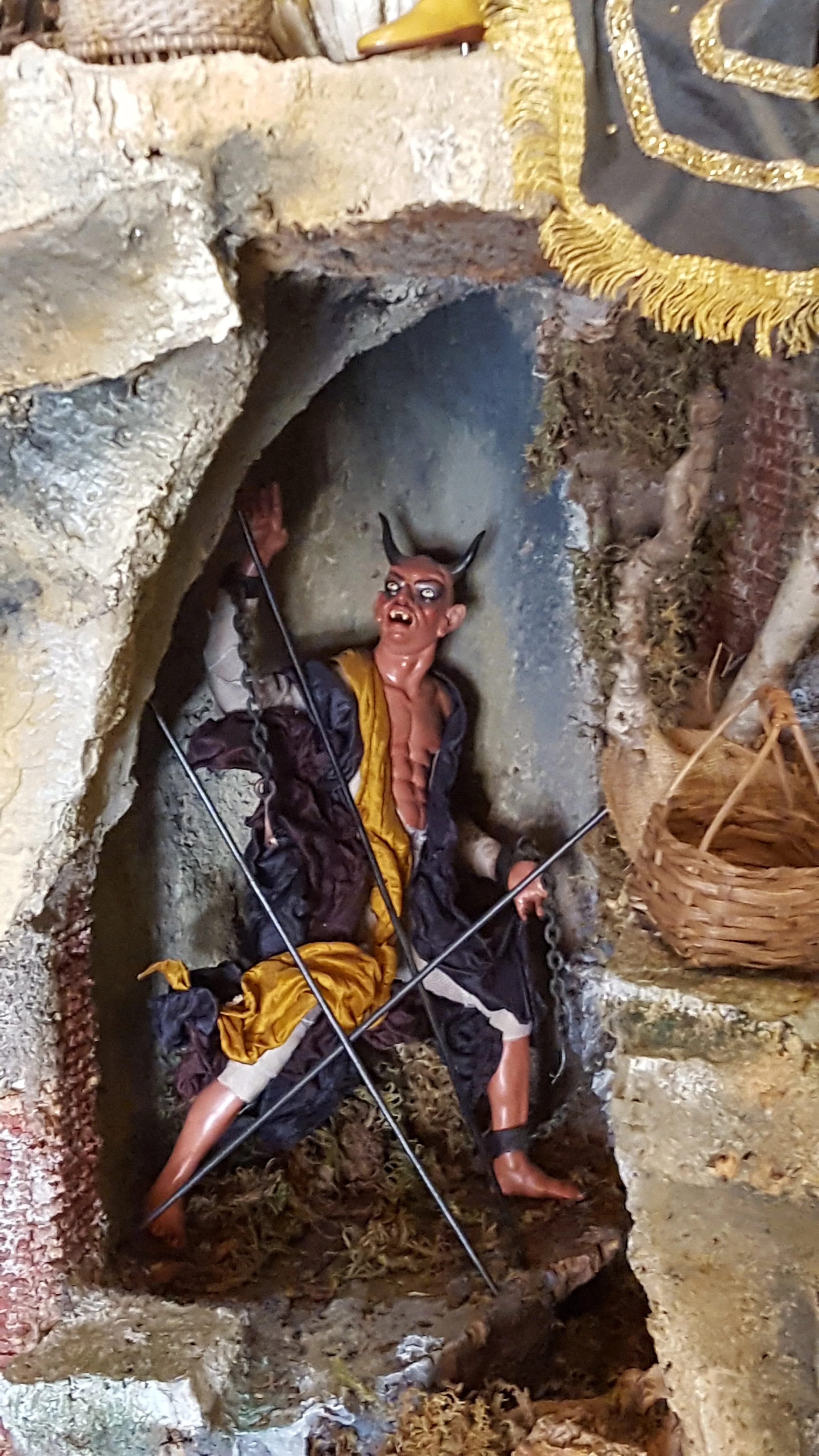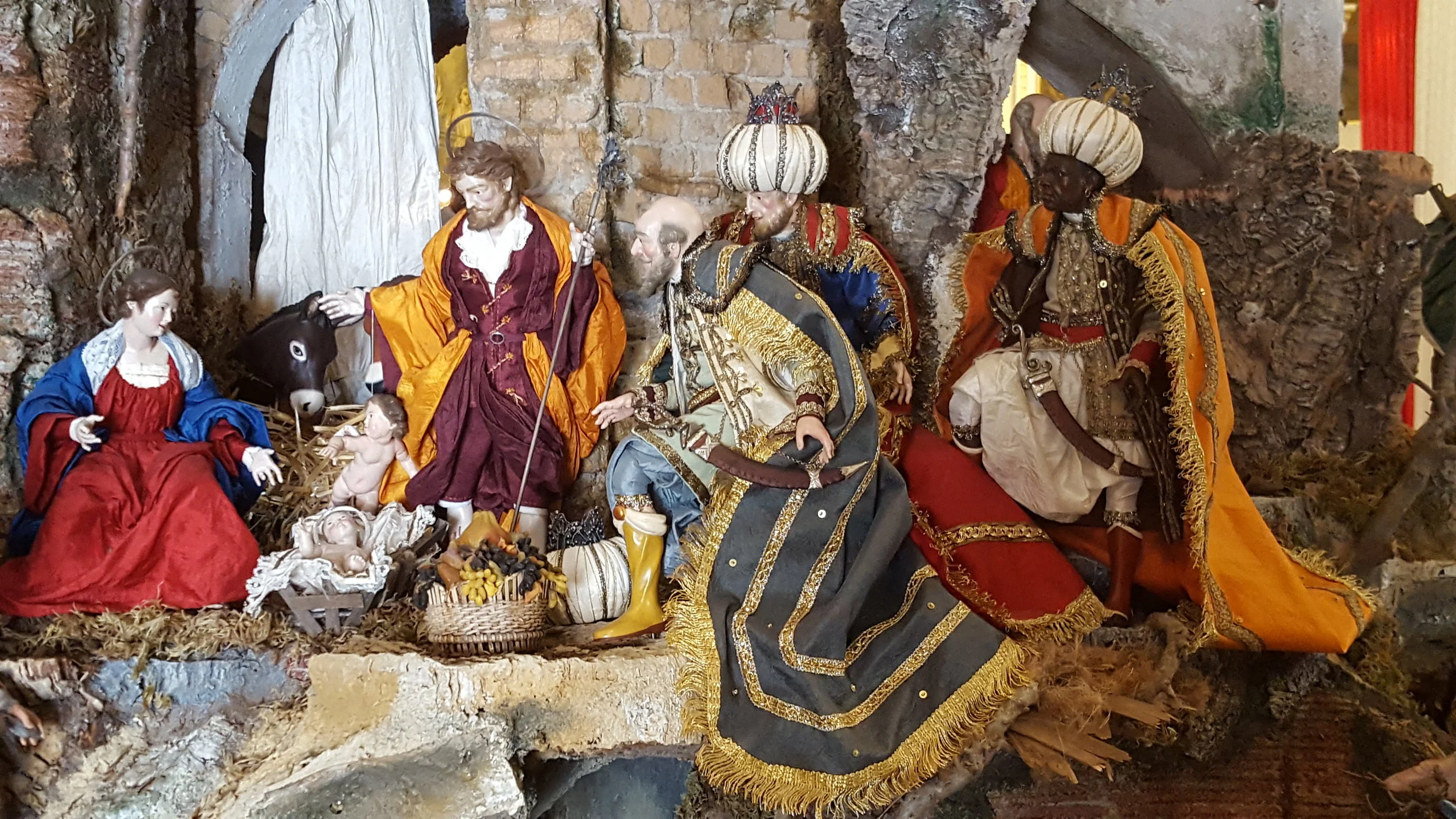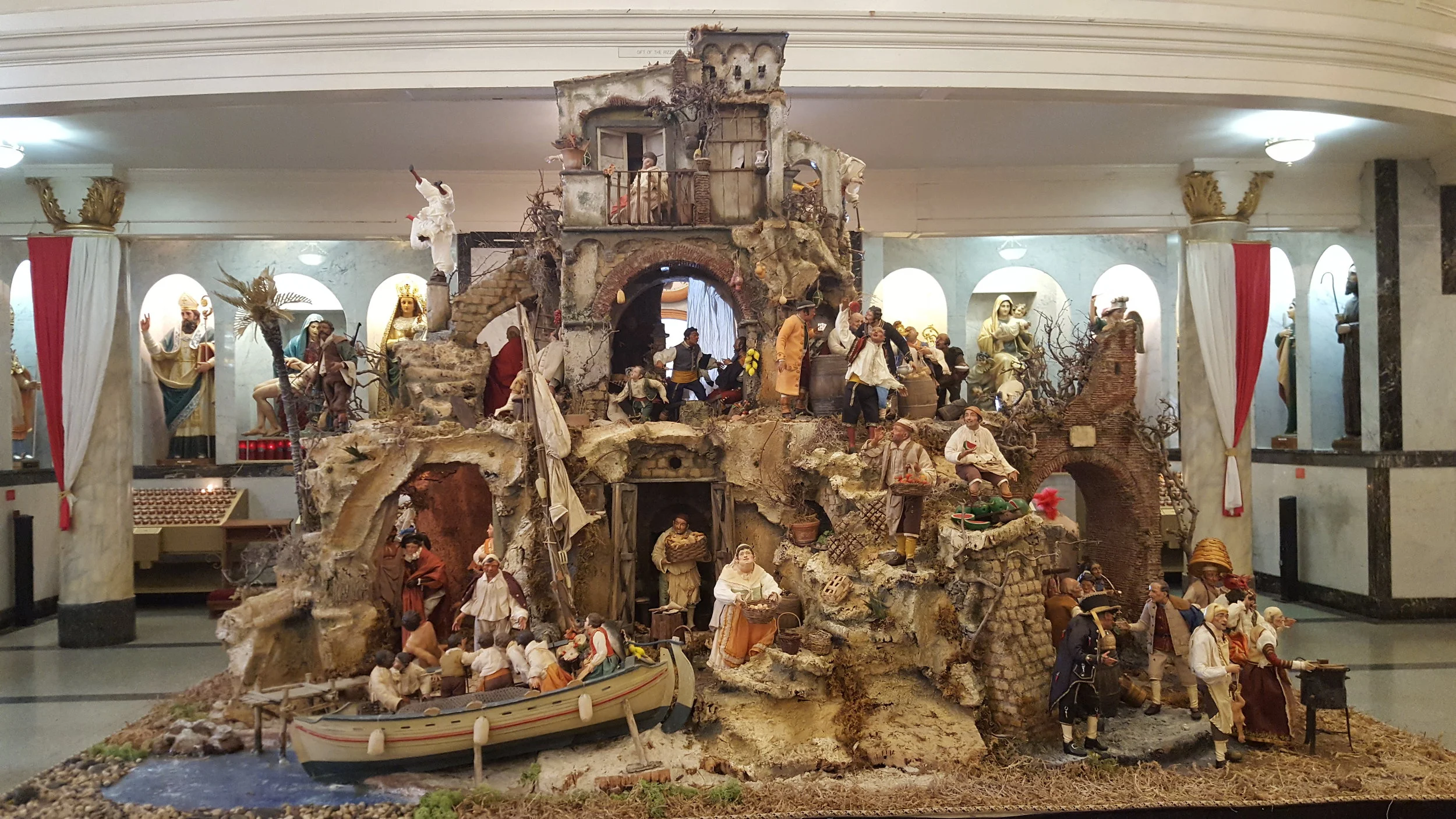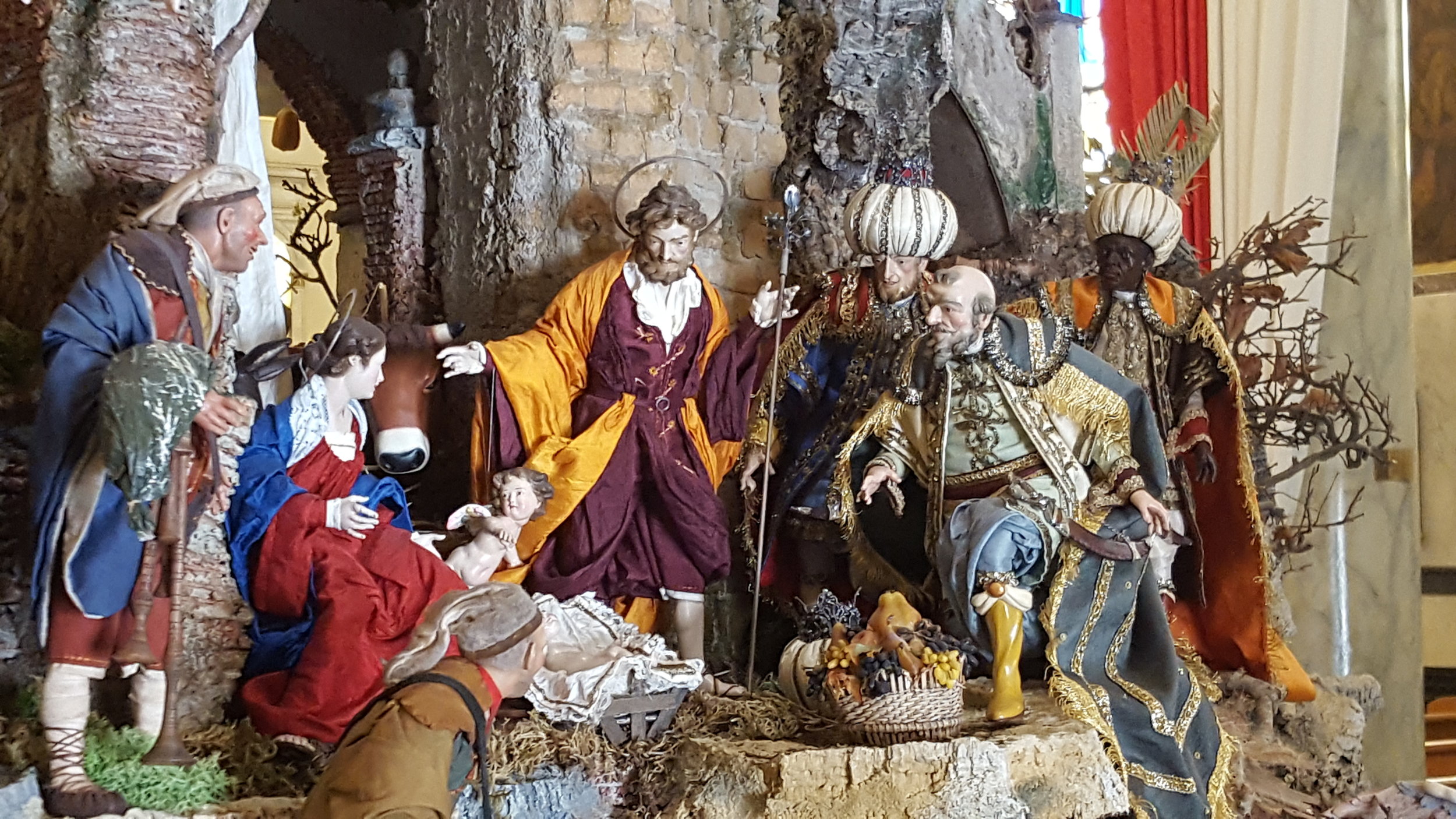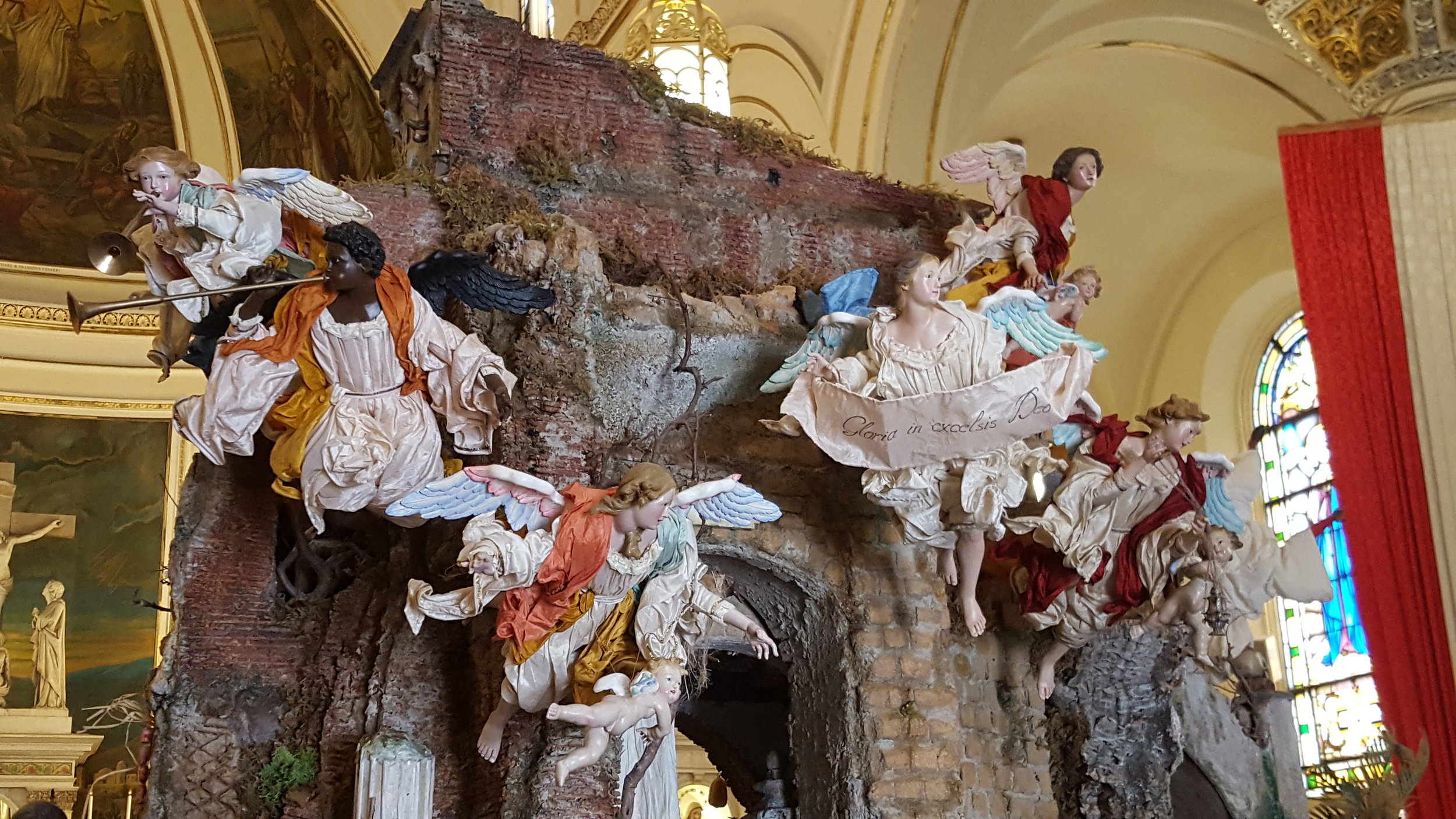This video contains a recording of "Naples is for Necromancers", a talk I gave as part of the Night of Folk Necromancy event organized by Morbid Anatomy and Radio Free Golgotha.
A Prayer Before the Presepio
The Presepio
No one does the presepio, or nativity scene, quite like the Neapolitans. The images above, taken last April at Most Precious Blood Church in Manhattan, demonstrate this. The traditional Neapolitan presepio has many characters, some would say up to 72, who were discussed in a previous blog post. Often, the modern presepio will incorporate political themes, or theme's from the spiritual life of the family that builds it: favored saints, etc.
A prayer to say before the presepio
The following prayer, posted by this lovely church website with plenty of information about Neapolitan folk Catholicism, can be said while standing before any nativity scene. It can be said by one person alone, or better yet, the different lines can be given to different members of the family as indicated.
What I love about this prayer is it demonstrates how material culture is used as a jumping off point for personal spirituality. Each element of the presepio inspires another line about the ways in which we hope to come closer to God.
English translation
All: Baby Jesus, our peace and reconciliation, have pity on us!
All: Lord Jesus, I come before your presepio with my heart full of trust and tenderness. I want to be like the shepherds who, in the middle of the night, woke up to come and see the Savior. Open my ears to hear the song of peace sung by the angels, and my eyes to see in you the Prince of Peace. May I recognize you as the Messiah in my life and bring me into your presence, as I see was done for your father and mother in this presepio. You come into the world to reconcile heaven and earth. Come reconcile me, as well, with the Father. I want to be with you for a little while in your cave: only those next to you will find peace and repose, my doubts become certainties, my troubles become stillness, my sadness becomes joy, my anxiety becomes serenity. In this space, my sorrow will find relief, I will take courage to overcome fear, I will refill myself with generosity in order not to give in to degradation and to resume the journey of hope.
Mother: Mary, I see in your face similarity to Jesus. You gave birth to the One who is our reconciliation. Mother, I take refuge in you and under your protection I implore God’s forgiveness. Make me like Him, to be Mercy like him.
Father: Saint Joseph, teach me to protect the presence of God within me as you have protected Baby Jesus and your wife Mary. Help me, along with the help of the Holy Angels, to recognize the devious attacks of those who would kill in me the living presence of the Lord that the Father has wanted for me since the day of my Baptism. May I, after the visit to this presepio, guard Jesus and Mary with the same love that I can admire in your eyes.
Children: Holy Angels of God, continue to be as today the voice of God that calls me, inviting me to rise up out of the darkness in which I fall because of my weaknesses and sin.
All: Glory to God! Alleluia! Amen!
Italian original
Tutti: Bambino Gesù nostra pace e riconciliazione abbi pietà di noi!
Tutti: Signore, Gesù vengo davanti al tuo presepio con il cuore pieno di fiducia e di tenerezza. Voglio essere come i pastori che nel cuore della notte si sono alzati per andare a vedere il Salvatore.
Apri anche le mie orecchie per sentire il canto di pace degli angeli e i miei occhi per vedere in te il Principe della Pace. Che io ti riconosca come il Messia nella mia vita e mi metta alla tua presenza, come vedo fare al tuo papà e alla tua mamma in questo presepio.
Tu vieni nel mondo per riconciliare il cielo e la terra. Vieni a riconciliare anche me con il Padre.
Voglio stare un po’ con te nella tua grotta: solo qui accanto a te troverò pace e riposo, i miei dubbi si muteranno in certezze, i miei affanni in quiete, la mia tristezza in gioia, il mio turbamento in serenità. In questo spazio troverà sollievo il mio dolore, acquisterò coraggio per superare la paura, mi riempirò di generosità per non arrendermi all’avvilimento e per riprendere il cammino della speranza.
Mamma/Sposa: Maria, vedo nel tuo volto la somiglianza con Gesù. Tu dai alla luce Colui che è la nostra riconciliazione.
Madre, mi rifugio in te e sotto la tua protezione imploro il perdono di Dio. Rendimi somigliante a Lui, per essere come lui Misericordia
Papà/ Sposo: San Giuseppe, insegnami a proteggere la presenza di Dio in me come tu hai protetto Gesù Bambino e tua moglie Maria. Aiutami, con l’aiuto dei SS. Angeli, a riconoscere i subdoli attacchi di chi vorrebbe uccidere in me la presenza viva del Signore che il Padre ha voluto per me nel giorno del mio Battesimo. Che, dopo la visita a questo presepio, io guardi Gesù e Maria con lo stesso amore che posso ammirare nei tuoi occhi.
Figli: Angeli Santi di Dio continuate ad essere come oggi la voce di Dio che mi chiama, invitandomi ad alzarmi dal buio in cui cado a causa delle mie debolezze e del peccato.
Tutti: Gloria a Dio! Alleluia! Amen!
Saint John
Happy Saint John’s Day! In Italy as in other parts of Europe, the feast of Saint John the Baptist (or San Giovanni Battista) is inextricably tied to magic, witches, and divination. Celebrated starting the night of June 23 into the day of June 24, the feast was popularized as a Christian alternative to (or innovation on?) the celebration of the summer solstice. Carol Field writes in Celebrating Italy (p. 92):
Christianity simply grafted the pagan fires to the celebration of the Feast of San Giovanni. The prophet was born precisely at midsummer, just as Jesus was born six months later at the turning point of winter, two moments in the calendar that mark passage across a critical threshold. Bearded and dressed in animal skins, subsisting on honey and locusts, San Giovanni also resembles an ancient god of the fields, or the mythical King of the Wood who married the Great Goddess in dark midwinter. Six months later, the King of the Wood was put to death beneath a great sacred oak by his successor. So this sacrificial death, with its intimations of rebirth and renewal, was meant to encourage the fertility of the fields.
U Muzzuni
Saint John's Day is known in Alcara li Fusi, a municipality in Messina, Sicily as La Festa di Muzzuni. This is one of my favorite Southern Italian folk traditions. It's also said to be one of the oldest. Although performed on the feast of Saint John, many recognize this as the survival a propitiatory rite to the Great Goddess Ceres or Demeter, who rules over the fertility of the earth. The rituals surrounding the Muzzuni are focused on finding love, and thus also may call upon Aphrodite and Adonis. In these rituals, young women dressed in white dance to love songs sung by male musicians.
The Muzzuni is constructed with an uncorked wine bottle ("headless", like Saint John himself), which is then stuffed with grains, covered with a handkerchief, and ornamented with precious metals. The Muzzuni is often placed between two oil lamps in front of a colorful tapestry.
You can see examples of the Muzzuni here, and in the video below!
Acqua di San Giovanni
As his name implies, Saint John the Baptist is often associated with water in regional folklore. In particular, the dew which collects overnight between June 23 and June 24 is believed to be magically potent. This dew can be collected, some say ideally by a woman who has fasted and who recites the Ave Maria as she goes about her business. This dew can then be combined with certain herbs and left out under the moon to gain magical potency.
One Italian source describes the following as standard herbs used in the preparation of this potion, or to be dried and used in other magical workings until the next St. John’s Day:
- the yellow-colored St. John’s wort, to be kept on the body all night to protect from misfortune, and to provide serene sleep, or outdoors to protect families;
- artemisia against the evil eye;
- rue for healing properties, and as a ward against the devil, given its cross-like shape;
- dewy mint that guarantees long life;
- sage to protect against evil creatures;
- verbena, symbol of peace and prosperity which was dear to witches and able to heal from illnesses;
- currant, whose red fruits are also called berries of St. John;
- periwinkle, also used for the preparation of vegetable talismans;
- mandrake, one of the most dangerous plants, with the dual faculty of sedating and exciting given its ambivalent essence, male and female; very dear to witches, used it to prepare narcotics and love filters;
- rosemary, hung with St. John's wort and rue at the doors of the houses, kept away the devils and witches;
- garlic, potent talisman, if harvested before sunrise was particularly strong against witchcraft; …
- lavender, with bouquets in drawers and cabinets, protected the linens and by extension the whole family;
- fern, which gave divinatory powers, supernatural forces and wisdom (according to popular belief, its flower opens only the Night of St. John, remains visible for only a moment and can only be harvested after fighting with the devil);
- carline thistle, which was used to prevent the witch's malicious passage; If nailed to the door of the house, it forces the witch to count all its caps...
The acqua di San Giovanni, properly prepared, is believed to increase beauty while protecting against the evil eye, envy, and curses.
Piombo di San Giovanni
Saint John's Eve was a traditional time of love divination, when young men and women would contact the spirit world to gain insight into their marriage prospects. One such divinatory spell involved melting lead and dropping it into cold water, where it would freeze into shapes which could then be interpreted according to traditional symbolism.
This ritual was often undertaken following a novena which lasted from the evening of June 15 until the vigil of the feast. While the prayer said on these nights was composed in regional dialect, a form in Florentine Italian is found in Il Libro dei Rimedi Magici by Guido Guerrara:
San Giovanni benedetto,
pe' un infame maledetto,
foste a morte condannato,
con sto' piombo coagulato,
conoscere mi fai,
la fortuna che mi dai,
San Giovanni della vita.
In English:
Blessed Saint John,
cursed by an infamous one,
you were condemned to death,
with this coagulated lead,
let me know,
the fortune that you give me,
Saint John of life.
Of course, if lead is difficult to get a hold of, or if you are concerned about the possibility of lead poisoning, you could also perform this ritual with an egg in water. To do so, it is advised to find a large, clear glass and fill it with water. Then, crack an egg and separate the whites from the yolk. Drop the whites only into the glass of water and leave out overnight on the windowsill. According to tradition, water covered in bubbles signifies that you will soon find a mate who is handsome, nice, and rich; the image of a building or church is a good omen, but marriage is not indicated in the short-term; and should no images appear, you'll just have to wait until next year!
Neapolitan Children's Prayers: Before bedtime
These classic Neapolitan prayers are taught to children by their mothers and grandmothers. Like children's prayers from around the world, these are short, simple, and rhyme. I've included recordings of how they are pronounced, in case you are not familiar with the language. (Please note, this is not my native tongue, so my pronunciation is not perfect.)
If you would like to learn more about the Neapolitan language, I highly recommend booking an online session with Anna Scognamiglio. I've been working with Anna for several months, and she is an excellent source on Neapolitan language and culture. Fans of this blog will especially enjoy working with her, because she knows several prayers, novenas, and superstitions. Your first lesson with her is free!
Napulitano
Me cocco e me faccio ‘a croce
‘a Maronna mè mamma
Gesù Cristo mè pate
e Sante mè so pariente
me cocco e nun aggio paura e niente.
Italiano
Mi corico e mi faccio la croce
la Madonna mi è mamma
Gesù Cristo mi è padre
i Santi mi sono parenti
mi corico e non tengo paura di niente.
English
I go to bed (lie down) and I make the sign of the cross
The Madonna is my mother
Jesus Christ is my father
And the saints are my relatives
I go to sleep and I don’t fear anything.
Napulitano
Je me cocco ‘int’ ‘a ‘stu lietto
e ‘a Maronna affianco ‘o pietto
jo dormo e Essa veglia,
si è coccosa me risveglia;
Gesù Cristo m’è pate
‘a Maronna m’è mamma
‘e Sante me so’ pariente
duorme… ca nun haje paura ‘e niente!
Italian
Mi corico dentro questo letto
la Madonna a fianco il petto
io dormo e lei veglia
se qualcosa mi risveglia;
Gesù Cristo mi è padre
i Santi mi sono parenti
dormi… che non hai paura di niente.
English
I go to sleep in this bed
The Madonna at the side of the chest
I sleep and she watches over me,
If anything, she wakes me up;
Jesus Christ is my father
The Madonna is my mother
The saints are my relatives
(You) sleep… you don’t have to fear anything.
Napulitano
E’ sunata ‘n’ora ‘e notte
e l’angiulillo p’‘a porta,
e Maria p’‘a casa;
‘o tristo jesce e ‘o buono trase
e Dio ‘nce guarda ‘o capo ‘e casa.
Italian
E’ venuta la notte
l’angelo è alla porta
Maria per la casa;
il tristo esce e il buono entra
e Dio protegge il capo di casa.
English
An hour of the night has struck
And the little angel is by (coming in?) the door,
And Maria is around the house
The sadness goes away and the goodness comes in
And God protects the head of the house.
Napulitano
Io me cocco ‘a lietto
e cu l’angelo perfetto
e cu l’angelo preganno
Gesù Cristo prericammo
Io me cocco e nun m’addormo
l’anema mia ‘a lascio ‘a Maronna
Io me cocco a lietto e nun m’addormesse
l’anema mia ‘a lascio ‘a Gesù Cristo
Io me cocco e nun me vene
tre cose a chiese tene:
cunfessione, cummunione e uoglio santo
e lu cantu ‘o Spiritussanto
aiutaci Maria a tutti quanti.
Italian
Io vado a letto
con l’angelo perfetto
e con l’angelo pregando
Gesù Cristo predichiamo
Io mi corico e non mi addormento
l’anima mia la lascio alla Madonna
Io vado a letto e se non mi addormento
l’anima mia la lascio a Gesù Cristo
Io mi corico e non mi viene (di addormentarmi)
tre cose la chiesa tiene:
confessione, comunione e olio santo
ed il canto allo spirito santo
aiutaci Maria a tutti quanti.
English
I go to bed
With the perfect angel
And with the angel praying
Jesus Christ we preach
I go to bed and I don’t fall asleep
My soul I leave to the Madonna
I go to bed and I wouldn’t want to fall asleep
My soul I leave to Jesus Christ
I go to sleep and it doesn’t come to me (i.e. I can’t fall asleep)
The church has three things:
Confession, communion, and holy oil
And the song to the holy spirit
Help us, Maria, all of us.
Napulitano
Bonasera Maronna mia
tutt’ ‘o munno a te s’inchina
cu’ chillu frutto ca dunaste
a tutt’ ‘o munno rallegraste
rallegraste l’anema mia
buona sera Maronna mia.
Italiano
Buonasera Madonna mia,
tutto il mondo a te s’inchina.
con quel frutto che donasti,
tutto il mondo rallegrasti,
rallegrasti l’anima mia,
buonasera Madonna mia.
English
Good evening, my Madonna
All the world to you bows.
With that fruit that you gave,
All the world you cheered up,
You cheered up my soul,
Good evening my Madonna.
La Smorfia Napoletana
La Smorfia is a type of Southern Italian gematria. It maps dream motifs onto numbers 1 through 90, revealing which numbers should be played in the lottery. Dictionaries mapping thousands of items and ideas onto these numbers are popular in Southern Italy, particularly Naples. You can read one online for free: Nuova Smorfia del giuoco del lotto (1866) - Giustino Rumeo
Or, if you are looking for an easier way to interpret your dreams according to La Smorfia, this website may be of help.
Tammurriata
Above: A mosaic from Pompeii which appears to depict the tammurriata being played and danced in Antiquity.
"The arms are held in front of the body with the elbows outward, and the movements that they make are basically two, inspired by agricultural activities. The first is a downwards gesture of sowing. The second is an upwards gesture that resembles the movements made when collecting fruit from trees. The steps of the tammurriata follow the rhythm of the drums and are characterized by mirrored movement of the feet, side-to-side, back and forth, or toe-to-heel of the two dancers. All in all, the dancers move in circles." - Arianna Sacco
Neapolitan edicola
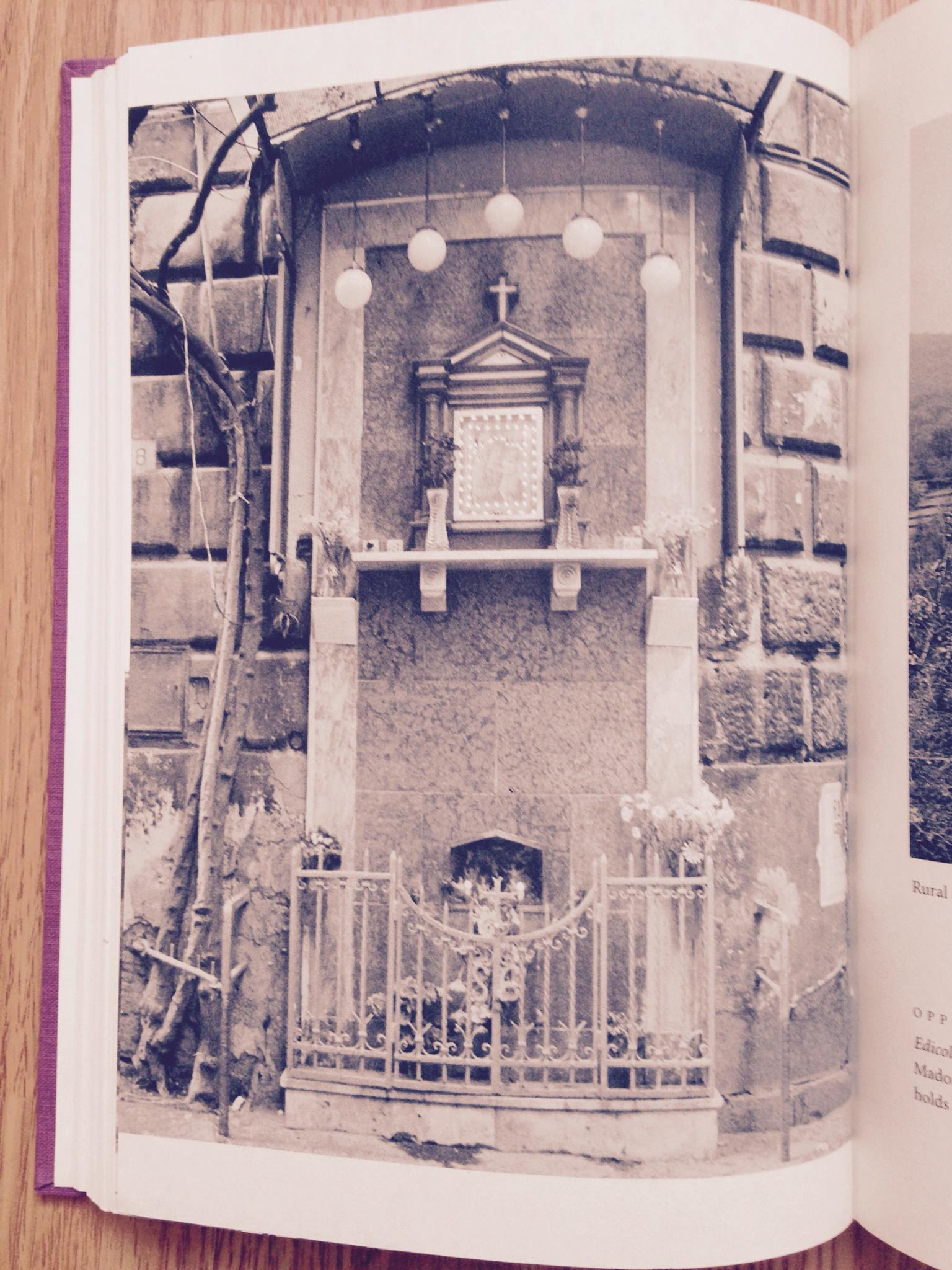
"Edicola at Naples. The niche at the top contains a Madonna con Bambino; the niche at the bottom holds a diorama of the souls in Purgatory."
Michael Carroll, Veiled Threats.
Santa Lucia Luntana
Santa Lucia luntana is dedicated to the many Neapolitan emigrants who departed from the porto di Napoli towards far away lands (almost always towards the Americas). The lyrics are inspired by the sentiments that these immigrants experienced while growing distant from the land, fixing their eyes towards the picturesque panorama of the neighborhood of Santa Lucia, the last part of their homeland that they would be able to see, always growing smaller, on the horizon. The song quickly became a success, not only in popular thought, and it was also very important at a social level because it brought to light the reality of emigration, a phenomenon up until then poorly understood by the official culture.
Napulitano
« Partono 'e bastimente pe' terre assaje luntane... Cántano a buordo: só' Napulitane! Cantano pe' tramente 'o golfo giá scumpare, e 'a luna, 'a miez'ô mare, nu poco 'e Napule lle fa vedé... Santa Lucia! Luntano 'a te, quanta malincunia! Se gira 'o munno sano, se va a cercá furtuna... ma, quanno sponta 'a luna, luntano 'a Napule nun se pò stá! E sònano...Ma 'e mmane trèmmano 'ncoppe ccorde... Quanta ricorde, ahimmé, quanta ricorde... E 'o core nun 'o sane nemmeno cu 'e ccanzone: Sentenno voce e suone, se mette a chiagnere ca vò' turná... Santa Lucia, ............ Santa Lucia, tu tiene sulo nu poco 'e mare... ma, cchiù luntana staje, cchiù bella pare... E' 'o canto de Ssirene ca tesse ancora 'e rrezze! Core nun vò' ricchezze: si è nato a Napule, ce vò' murí! Santa Lucia, ............ »
Italiano
« Partono le navi per le terre assai lontane... Cantano a bordo: sono Napoletani! Cantano mentre il golfo già scompare e la luna in mezzo al mare un poco di Napoli gli fa vedere Santa Lucia! Lontano da te quanta malinconia! Si gira il mondo intero si va a cercar fortuna... ma, quando spunta la luna lontano da Napoli non si può stare! E suonano!Ma le mani tremano sulle corde... quanti ricordi, ahimé, quanti ricordi... E il cuore non lo guarisci nemmeno con le canzoni: sentendo voce e suoni, si mette a piangere che vuol tornare... Santa Lucia, ............ Santa Lucia, tu hai solo un poco di mare... ma più lontana sei, più bella sembri... Ed il canto delle Sirene che tesse ancora le reti Il cuore non vuol ricchezze: se è nato a Napoli ci vuol morire! Santa Lucia, ............ »

